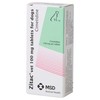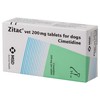Zitac
Zitac Vet Tablets are for the symptomatic treatment for the reduction of vomiting associated with chronic gastritis in dogs. They contain the active ingredient Cimetidine which acts to reduce the acid secretion in the stomach, which subsequently reduces persistent inflammation of the stomach wall.
Zitac Vet Tablets are oblong in shape and scored on both sides for easy and accurate dosing.
Zitac Vet 100mg Tablets for Dogs
£0.35Zitac Vet 100mg Tablets are indicated for the symptomatic treatment for the reduction of vomiting associated with chronic gastritis in dogs. Zitac Tablets contain cimetidine which acts to...[More info]
Zitac Vet 200mg Tablets for Dogs
£0.58Zitac Vet 200mg Tablets are indicated for the symptomatic treatment for the reduction of vomiting associated with chronic gastritis in dogs. Zitac Tablets contain cimetidine which acts to...[More info]
Dosage and administration
Dose and route of administration: 5 mg of cimetidine per kg of bodyweight administered three times daily by the oral route. Tablets may be split to facilitate dosing. The concomitant use of appropriate dietary measures is strongly recommended. In clinical trials the efficacy of cimetidine has only been studied concomitantly with a hypoallergenic diet.
Recommended treatment scheme: reduction of vomiting is achieved in about 2 weeks. Animals should however be treated for at least 2 weeks after the remission of clinical signs, so a minimum treatment duration of 28 days is recommended. If considered successful, medication should be withdrawn for 2 weeks. If vomiting occurs again, treatment can be re-initiated, without risk for intolerance. Depending on the response, treatment can be adapted to the individual animal until the response is considered to be adequate and continued. Dietary measures should always be maintained.
Contra-indications, warnings, etc
Treatment with cimetidine is symptomatic only and does not result in resolution of histopathological changes associated with gastritis. It is recommended that dogs showing persistent vomiting should undergo appropriate investigations to diagnose the underlying cause before starting treatment. This is especially important in older animals. The reduction of gastric acidity caused by cimetidine may contribute to bacterial overgrowth and antigenic stimulation. If the response to treatment is poor within 15 days, the diagnosis and treatment plan should be re-evaluated. In case of renal dysfunction, adjustment of the dose may be required as the clearance of cimetidine may be decreased. Transient and self-resolving slight swelling of mammary glands may be observed in female dogs (gynaecomastia; anti-androgenic activity). A reduction of prostate weight was also observed in male rats and dogs, with no impact on reproductive performances; this effect was reversible. No other undesirable effects were reported. If you notice any serious effects or other effects not mentioned in this leaflet, please inform your veterinary surgeon. The use of the product during pregnancy and lactation in the target species has not been investigated. Therefore, use of the veterinary medicinal product during pregnancy and lactation should be based on a risk benefit-assessment by the responsible veterinary surgeon. Due to inhibition of cytochrome P-450 activity by cimetidine, the metabolism and elimination of some drugs can be reduced. Clinically relevant interactions may occur with compounds having a narrow therapeutic index, e.g. beta-blockers, calcium channel blockers, benzodiazepines, barbiturates, phenytoin, theophylline, aminophylline, warfarin and lidocaine. Doses of such drugs may need to be reduced when administered concomitantly with cimetidine. The increased gastric pH resulting from cimetidine administration may lead to reduced absorption of drugs requiring an acid medium for absorption. It is recommended that at least 2 hours should elapse between administration of cimetidine and aluminium or magnesium hydroxide, metoclopramide, digoxin or ketoconazole when possible.
Overdose:
Acute exposure to cimetidine yielded LD50 values above 2600 mg/kg, i.e. over 170 times the recommended daily dosage in dogs. A target animal safety study in dogs demonstrated that the product administered orally at 75 mg cimetidine/kg/day (five times the recommended daily dose) for a period of 91 days was well tolerated by dogs. No signs of overdose are known.
Withdrawal period
Not applicable.
For animal treatment only. Keep out of the sight and reach of children.

